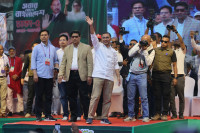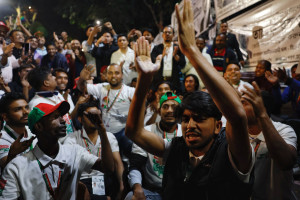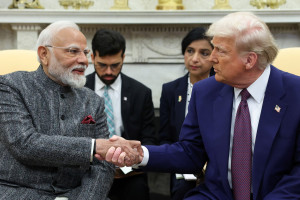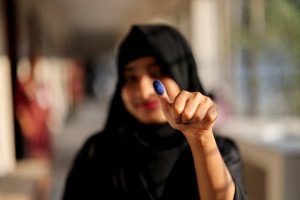World
Bangladeshis getting tricked into Russia’s war: Report
An investigation by BRAC Migration Programme shows the men travelled to Russia with valid work visas, believing they had secured well-paying jobs in oil, construction, or logistics.
The Daily Star
The report titled “Promises Written in Blood: How Legal Migration Turned into Forced Recruitment in the Russia-Ukraine War,” is based on survivor accounts and family testimonies. It details how at least 10 Bangladeshi men, lured by promises of secure jobs and decent pay, ended up in combat zones. Some of them are feared dead.
According to the report, the men travelled to Russia with valid work visas, believing they had secured well-paying jobs in oil, construction, or logistics. Instead, upon arrival, their passports were confiscated, and they were coerced into auxiliary combat units and sent to military camps near the front lines.
The report urged immediate, coordinated action by the government and international actors, warning that “untrained foreign labourers are being used as expendable manpower”.
BRAC found that the victims followed proper migration procedures — obtaining authentic work visas, departing from recognised airports, and carrying legitimate contracts.
However, once in Russia, their passports and phones were seized “for processing,” and they were forced to sign “voluntary service agreements” before being transported to undisclosed military sites.
Illegal trafficking also occurs. Recruiting agents here, under the pretext of high-paying jobs, send people to Russia, and hand them over to intermediaries who give them to the military as forced labourers or combatants.
The exact number of Bangladeshis involved is Russia’s war is unknown. The Criminal Investigation Department (CID) estimates that around 2,000 people have travelled to Russia with work visas in recent years, alongside others who went as students or for other purposes. BRAC believes hundreds may now be in the conflict zones.
Among the deceived was Afzal Hossain Meraj, who went to Russia in August 2023 to work as a welder with a salary of Tk 70,000. He had paid Tk 6.5 lakh to a recruiting agency in Uttara, including training fees.
After four months, a broker in Russia offered him a “better opportunity”, to enlist with a Tk 26 lakh signing bonus and Tk 3.3 lakh monthly pay. Other perks included Tk 15 lakh injury compensation, and possible citizenship if Russia won the war.
Tempted, Meraj agreed, only to have his passport seized and sent to the front lines.
“We were lost and helpless when my son called me secretly on WhatsApp and IMO from the war zone. He said he could be killed at any time,” said Meraj’s father, Ali Hossain.
Meraj witnessed two other Bangladeshis get killed in combat.
He got shot in the thigh in June, fled a hospital, and reached the Bangladesh embassy in Moscow, which arranged his return in September.
“Yes, we got some money, but they sent my son to a war zone with false promises,” Ali said. “Life is more important than money.”
According to a source, recruiters lure Bangladeshis by promising they will continue doing the same jobs they were doing, just near the front line. However, after signing the contract, they are forced to take part in the war.
Not everyone was as fortunate.
Ayan Mondol from Bagerhat last contacted his family months ago, saying he was being moved toward the Ukrainian border; he is believed to have been killed in a drone strike.
Amit Barua from Cumilla was photographed wearing a Russian military uniform. He remains missing.
Mohsin Ahmed from Gafargaon, Mymensingh, also went to Russia for a welding job but was forced into the army.
The Daily Star contacted his brother, Mahfuz Ahmed. He said Mohshin was injured in a drone attack and was treated for three days and sent back to the battlefield.
On April 21, his family submitted an appeal to the foreign ministry, seeking assistance.
Mahfuz said many other Bangladeshis are still on the front lines. “It’s uncertain whether my brother will be able to return. We haven’t had any contact with him for months.”
He added that Russian authorities tightened surveillance after some Bangladeshi workers managed to return with travel passes.
The BRAC report said it has submitted rescue applications for victims to the Ministry of Foreign Affairs and handed case files to the CID for investigation. It is also providing legal and psychosocial support to families.
The report warned that this exposes “major weaknesses in Bangladesh’s migration management system”. Without stronger oversight, legal migration routes could be exploited for trafficking and coercion, threatening the country’s international reputation and future labour agreements.
Coordination between organisations and the foreign ministry remains reactive rather than preventive, it added.
Mostafizur Rahman, additional superintendent (Trafficking in Human Being) of CID, said six cases have been filed over trafficking to Russia. “Alongside legal migration, people have also been sent illegally and ended up in war zones,” he said.
“We found that at least 10 Bangladeshis were sent illegally over the last two years. Only two have returned; one remains in contact, and seven others — four to five of whom are suspected dead — are missing.”
He said, “We suspect over 30 Bangladeshis were killed in the war.”
He noted that no bodies have yet been repatriated but added that forced recruitment “almost stopped after June this year”.
Shariful Hasan, associate director of BRAC Migration Programme, said, “We still do not know how many Bangladeshis are stuck in Russia or how many have been killed. Reports of deaths keep coming from multiple sources.”
He also expressed concern that a Bangladeshi youth, using a verified Facebook account under the name Md Sohel, is encouraging others to join the Russian war effort. “Despite this, no visible action has been taken by authorities to raise awareness,” he said.
Shariful urged the government to conduct a nationwide survey to identify the missing and launch a strong awareness campaign. “If we don’t act now, the cost will be more human lives.”
In association with the Asian News Network




 11.12°C Kathmandu
11.12°C Kathmandu















